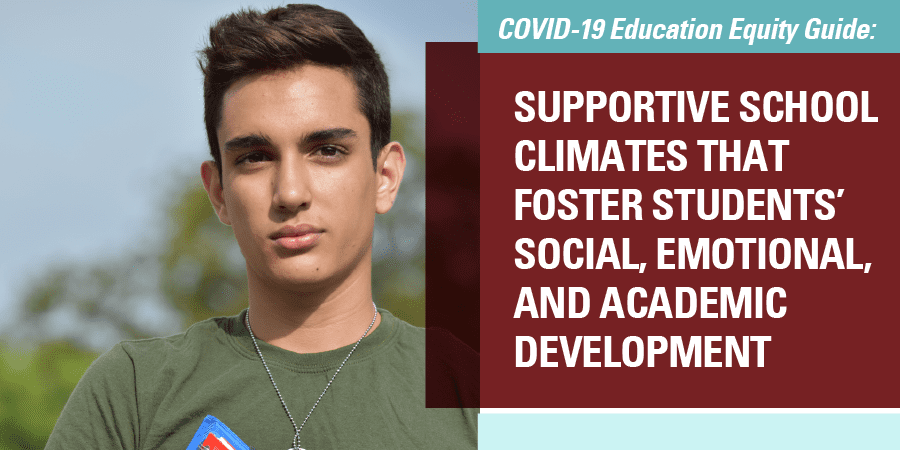COVID-19 Education Equity Guide: Supportive School Climates That Foster Students’ Social, Emotional, and Academic Development
Existing research shows that all learning is inherently social and emotional, and resources that support the holistic development of…

October 29, 2020 by
EdTrust
Existing research shows that all learning is inherently social and emotional, and resources that support the holistic development of students can improve their academic performance. Students from low-income backgrounds and students of color are more likely to experience the health and economic impacts of the COVID-19 crisis, and that, in turn, may affect their stress and anxiety levels. Additionally, many students with disabilities did not receive services during school closures and may have heightened needs in the fall, especially students with emotional disabilities and students with behavioral needs due to their disability. What’s more, many students have become used to having more autonomy, since they have been out of school for months. When students return to a structured school setting or when they engage in virtual learning, educators must give students time to readjust to expectations and resist the urge to respond to behavioral infractions with punitive discipline practices, especially if funding for counselors and other student supports is cut. Studies show that punitive discipline practices are disproportionately applied to students of color, who are more likely to be suspended or expelled even though they are not more likely to misbehave. State leaders must divest resources from those that criminalize and push students out and invest resources in supporting students’ social and emotional well-being.
EQUITY PRINCIPLE: Every student – particularly students of color, students from low-income backgrounds, English learners, students of color with disabilities, and students experiencing homelessness – has access to a physically safe, inclusive, and emotionally supportive environment at school or in their new virtual learning setting, with fair and consistent rules and discipline policies that minimize lost instructional time, positive relationships with staff and students that foster belonging, meaningful family engagement, and a system of supports to meet their social, emotional, and academic needs.
EQUITY ACTIONS:
- Provide funding and guidance for professional development and coaching for adults in schools on developing and cultivating positive, asset-based, and anti-racist mindsets, addressing implicit bias, and developing the skills needed to integrate social-emotional supports into academics.
- Provide funding for counselors, social workers, psychologists, and other health professionals, prioritizing districts and schools serving the most students of color and students from low-income backgrounds. In this time of declining revenue, it is particularly important to reallocate resources from school police or similar structures that criminalize students into these more supportive and research-based resources.
- Create language-accessible guidelines that set consistent statewide expectations for virtual outreach to and support for students and families in the event of future school closures, use multiple methods to connect with hard-to-reach families, and ensure accessibility for individuals with disabilities.
- Provide funding and build structures (e.g., Children’s Cabinets) for integrated student supports, community schools, or other models that ensure students have access to wraparound services, prioritizing districts and schools serving the most students of color and students from low-income backgrounds.
- Provide guidance for districts about leveraging community partnerships to identify no- or low-cost ways to meet students’ most urgent social-emotional and physical and mental health needs and provide funding for community schools and other efforts to partner with communities.
- Prohibit the use of suspensions and expulsions for minor offenses, provide funding for professional development on using restorative practices, and, in the 19 states where it is still allowed, ban the use of corporal punishment.
- Prohibit the use of exclusionary discipline practices in virtual learning settings, such as blocking students from virtual learning platforms or suspending their school email accounts, for minor offenses (e.g., dress code violations).
Moving Toward Better State Discipline Policies
In 2012, Massachusetts legislators passed a law known as Chapter 222 to reduce the use of out-of-school suspensions for minor infractions by requiring educators to first try alternatives such as restorative justice or positive behavioral interventions and supports. The law also requires districts to disaggregate and report discipline data, which allows the Massachusetts Department of Education to offer increased support to districts that suspend students for long periods of time and that have persistent disparities in suspensions. Although the state can still do much more to ensure students of color are not missing valuable class time, the state has significantly decreased the percentage of Black and Latino students suspended out of school.
Source: Ed Trust Calculations of Out-of-School Suspensions with SSDR data retrieved from http://www.doe.mass.edu/infoservices/research/




